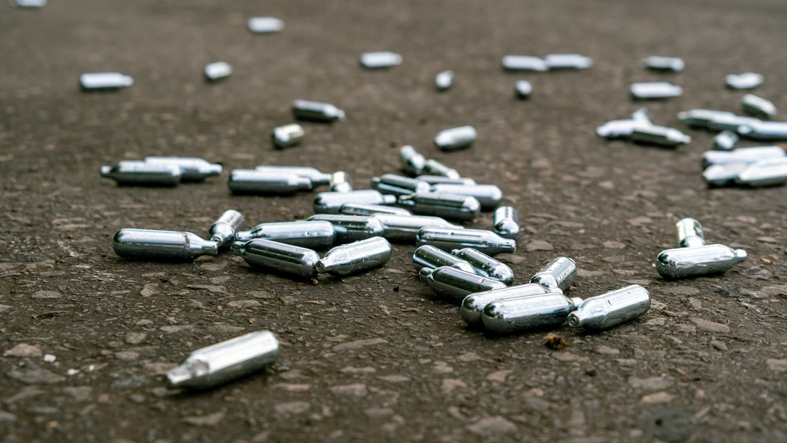On Sunday, the Levelling-Up Secretary Michael Gove announced that the government would ban the possession, use and sale of nitrous oxide – otherwise known as laughing gas or “nos”. A day later, Number 10 went full throttle on its assault against laughing gas.
This bred confusion, given that nitrous oxide for recreational purposes was already banned under the New Psychoactive Substances Act of 2016, and came just weeks after a review into the harms of nos which recommended against further criminalisation.
It later emerged that the government will add nitrous oxide to the list of substances banned under the Misuse of Drugs Act 1971, with nos set to become a class-c substance, meaning possession could be punishable with up to two years in prison.
The decision from the government – and swiftly backed by the opposition – contradicts the guidance published by the Advisory Council for the Misuse of Drugs Act, who are the independent body that the government receives guidance from in relation to substance use.


Just a couple of years on from the covid pandemic, when the government was keen to highlight that it was hellbent on “following the science”, this seems like a decision that flies in the face of evidence.
Nos is the second most used illicit substance among young people, behind cannabis, but the harms associated with nos are viewed as far less significant than other illicit substances. 45 people have died from nitrous oxide since 2010, whilst 840 people died from a cocaine related death in 2021 alone.
Harms from nos stem mostly from vitamin B12 deficiencies and neurological damage, and may be linked to new larger canisters – often imported from the Netherlands and which contain 80 times the amount of a whippet – which are used only for illicit, recreational purposes. It is thought that the most severe harms of nos are felt by a tiny minority – less than 0.05% of the annual nos-using population.
The wider context to this rash decision is purely political. Both Labour and the Government are desperate to be tough on crime, and tough on antisocial behaviour. The littering of small cannisters in parks and playgrounds is clearly a door-step issue ahead of the local elections, but adding nos to the Misuse of Drugs Act will do nothing to address the litter problem. In fact, for large swathes of the population – namely young people – this could increase harm and lead to negative outcomes.
If this was really about litter, then the solution would be to get tough on littering, which is also already illegal. The littering of alcohol vessels, cigarette butts and fast food boxes are far more prevalent, but it is nos canisters that have become the target for ‘getting tough’.
This lends itself to an increasing fear among people working in the fields of criminal justice, drug and alcohol treatment and young people’s services, that substances are the target but the solution to reduce harms is being ignored.
The banning of nitrous oxide could further drive the trade underground – such as the wider use of aforementioned large imported canisters – which will in turn have grave consequences. At Cranstoun, the social justice charity for which I lead on policy, we place emphasis on addressing the root cause of issues and following the evidence.
I spoke with our Head of Young Persons services, Vicky Branch, on what this ban could mean for young people. Branch said “we are concerned about the unintended consequences this ban will have for our young people. It potentially increases their risk and vulnerability by accessing nitrous oxide from street dealers and criminal gangs and the likelihood of receiving a criminal record. Neither of these will decrease their health or social harms exposing them to further injustices. The recommendations which have been ignored from the ACMD, provided a proportionate and sensible way forward to tackle non legal supply and reduce associated harms.”
Beyond local election posturing, there is an increasing fear among those who believe that criminalising drug possession has negative consequences, that this ‘tough’ strategy will continue beyond the locals and into next year’s general election – at the detriment of people suffering the consequences of bad policy making in relation to drugs.
In line with this, the government also announced this week that there would be fines of £1000 for those caught begging – a policy incompatible with their 2019 election pledge to end homelessness by the end of this parliament. Criminalising and financially punishing people already living on the streets will not eradicate homelessness, or tackle begging but enables the ruling party to seem tough. A strategy designed to win votes, not one to support the most vulnerable in society.
Given that the Conservatives have long been seen as the party of Law and Order, and there is clearly an attempt from Labour to outflank the government on the issue of crime. After 13 years in power, this is a reasonable attack-line from Labour. However, the crime debate must be fought on real issues that affect people, and not a headline-friendly race to the bottom.
There are solutions to the nuisance of nitrous oxide littering – such as a canister deposit scheme where money is returned for those who do not litter disused canisters, better drug education for young people and the targeting of online illicit sales. None of these solutions will harm young people or benefit the illicit market, but are genuinely tough on anti-social behaviour.

